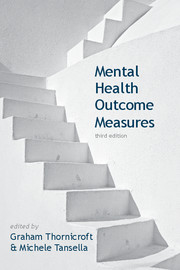Book contents
- Frontmatter
- Contents
- List of tables, boxes and figures
- List of contributors
- Foreword
- Foreword
- Preface: an evolving perspective of mental health outcome measures
- Part I Methodological issues
- Part II Domains of outcome measurement
- Part III Symptom severity outcome measures
- 13 Top-down versus bottom-up measures of depression
- 14 Symptom severity outcome measures for depression
- 15 Outcome measures for people with personality disorders
- 16 The Schedules for Clinical Assessment in Neuropsychiatry and the tradition of the Present State Examination
- Part IV International approaches to outcome assessment
- Index
15 - Outcome measures for people with personality disorders
from Part III - Symptom severity outcome measures
Published online by Cambridge University Press: 02 January 2018
- Frontmatter
- Contents
- List of tables, boxes and figures
- List of contributors
- Foreword
- Foreword
- Preface: an evolving perspective of mental health outcome measures
- Part I Methodological issues
- Part II Domains of outcome measurement
- Part III Symptom severity outcome measures
- 13 Top-down versus bottom-up measures of depression
- 14 Symptom severity outcome measures for depression
- 15 Outcome measures for people with personality disorders
- 16 The Schedules for Clinical Assessment in Neuropsychiatry and the tradition of the Present State Examination
- Part IV International approaches to outcome assessment
- Index
Summary
Personality disorders are common conditions, associated with significant burden to the individual, those around him or her and society as a whole. This chapter first briefly examines the classification and epidemiology of personality disorders, before it goes on to review current research on outcome measures for personality disorders, the instruments used in their assessment and the outcome measures used in randomised controlled trials of interventions for borderline personality disorder.
Definition and classification of personality disorders
The concept of abnormal personality was recognised by many ancient cultures, including the Ancient Greeks, Chinese and the Celts, although the modern usage of the concept of ‘personality disorder’ can be traced to the eighteenth century (Tyrer et al, 1991).
The diagnostic features of all personality disorders are listed in Box 15.1. Although the clinical features of personality disorders describe characteristics that any individual may possess in varying degrees from time to time, it is the enduring, inflexible and dysfunctional nature of such personality traits that distinguishes those who have personality disorders from those who do not.
Box 15.1 Core diagnostic features of all personality disorders
• Maladaptive patterns of behaviour, thinking, emotions and perceptions.
• Enduring and pervasive disturbance that is not limited to episodes of mental illness.
• Considerable personal distress and/or significant problems in personal, occupational and/or social functioning.
• Early manifestations (e.g. conduct disorder) in childhood.
While ICD–10 (World Health Organization, 1992) continues to retain personality disorder within the main rubric of mental disorders, DSM has, since its third revision in 1980, placed personality disorders on a separate axis, Axis II (American Psychiatric Association, 1980). Table 15.1 lists the specific personality disorders classified by ICD–10 and DSM–IV (American Psychiatric Association, 1994). DSM–IV recognises three ‘clusters’ of personality disorder:
• cluster A (the ‘odd or eccentric’ types) – paranoid, schizoid and schizotypal personality disorder
• cluster B (the ‘dramatic, emotional or erratic’ types) – histrionic, narcissistic, antisocial and borderline personality disorders
• cluster C (the ‘anxious and fearful’ types) – obsessive–compulsive, avoidant and dependent.
- Type
- Chapter
- Information
- Mental Health Outcome Measures , pp. 251 - 265Publisher: Royal College of PsychiatristsPrint publication year: 2010



